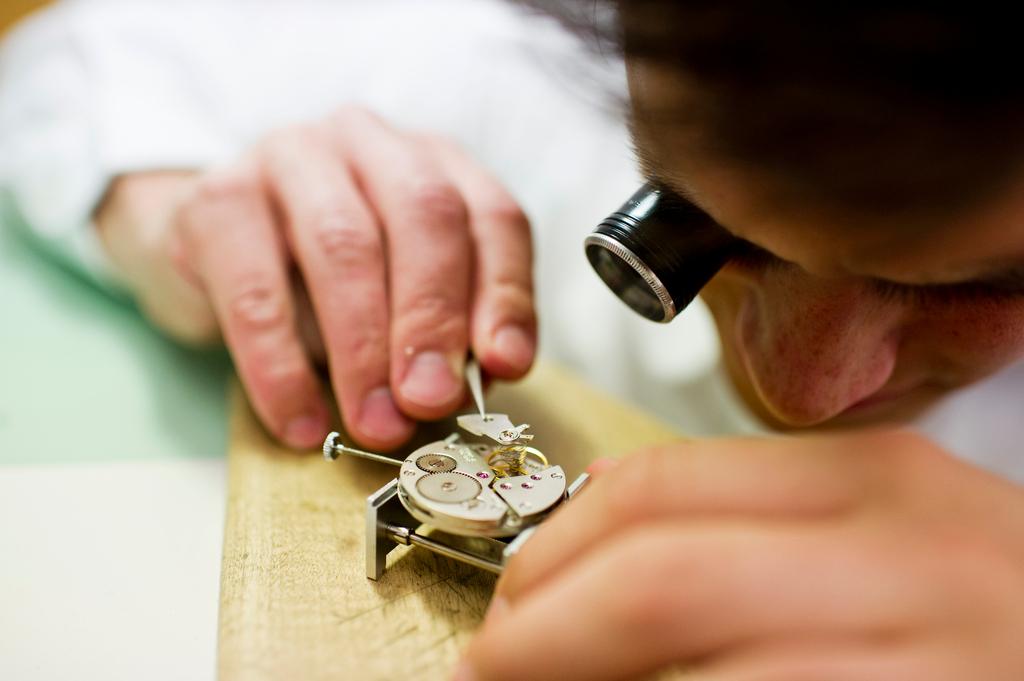Swiss luxury watch industry smart enough to face down challenges

The Beyer watch shop on Zürich's prestigious Bahnhofstrasse has sold timepieces since 1760. It will take more than a strong Swiss franc, turmoil in Asian financial markets and the rise of the Apple smartwatch to ruffle its immaculately dressed shop assistants.
“Once the economic outlook improves, it will be ‘business as usual’ again,” says Markus Baumgartner, sales director. “Smartwatches are absolutely not a threat for us.”
This week, however, came signs that the Swiss watch industry was not ticking as it should. A report by Deloitte showed that pessimism about the economic outlook was at its highest since at least 2012, when the consultancy’s annual surveys were launched.
Top of executives’ worry lists were weak foreign demand and the Swiss currency’s strength. The Swiss franc has risen 10 per cent against the euro since the start of the year, when the Swiss National Bank abandoned attempts to cap its value.
But despite the calm on Zürich’s Bahnhofstrasse, concern about smartwatches was also up sharply. A year ago, just 11 per cent of respondents were worried about the competitive threat. This year it was 25 per cent.
The rising nervousness follows signs that smartwatches are moving into the same luxury segments as high-quality Swiss watches. Next month, for example, Apple watches with Hermès leather bands will be launched.
“The smartwatch market is evolving – they are trying to appeal to a less tech-friendly audience, they are becoming more like fashion accessories,” says Jules Boudrand, one of the authors of the Deloitte report. The biggest threat is in the market for watches costing less than SFr1,500 (€1,370), he warns.
With its focus on the top end of the market, the Swiss watch industry – the world’s largest by the value of exports – had largely assumed that it could comfortably meet the smartwatch challenge. But Swiss manufacturers have had a turbulent year.
Sales have been hit by uncertainty over the economic outlook in Asian and Latin American emerging markets – and additionally in China by a clampdown on extravagant gifting. Swiss watch exports in July were 9.3 per cent lower than a year earlier; Asian sales were down 21.4 per cent.
The tabular content relating to this article is not available to view. Apologies in advance for the inconvenience caused.
The nightmare for Swiss watch executives would be if smartwatches won the battle for the wrists of the wealthy – grabbing the space where time pieces are traditionally worn.
They do not want a repeat of the crisis the Swiss watch industry faced in the 1980s, after it failed to counter the challenge of Japanese manufactured quartz watches.
The Swiss industry is still far from that point. The Deloitte survey showed that Swiss watchmakers’ optimism about sales in the US – home of the smartwatch – was at a record high. Share prices of luxury goods makers leapt this week after an unexpectedly upbeat business update from Richemont, the Swiss luxury goods company. Sales of its Cartier watches appeared to have helped.

More
Financial Times
External linkInnovation drive
Moreover, concerns about smartwatches are driving innovation across the Swiss industry, which could help longer term sales. “At the lower end of the Swiss market you do see more anxiety than a year ago,” says Jon Cox, equity analyst at Kepler Cheuvreux. “Smartwatches will cause a loss of market share and hit revenues, but they could also reinvigorate some sectors.”
Nick Hayek, chief executive of Swatch, told Schweiz am Sonntag newspaper last weekend that lessons had been learnt from the 1980s – when his father used Swatch to lead the rescue of the Swiss watch industry.
Today it was “one of the most innovative industries in the world”, he argued. Apple had created opportunities for Swatch by boosting demand for its own “smartwatches”, he said. “We’ve been trying since 2000 to sell such watches – without success. Now Apple is there and boosts interest.”
Meanwhile, Montblanc this year launched “e-Straps” for its watches, which link to smartphones.
There is a contrasting school of thought that by encouraging younger people to wear devices on their wrists, smartwatches are securing the future of luxury watches.
High quality, expensive Swiss timepieces will remain a means for the wealthy to distinguish themselves, argues R. James Breiding, author of Swiss Made, the story of Switzerland’s industrial success. “As long as there is vanity and [Swiss] watches are a way of conveying that, there will be a market for them.”
At Beyer in Zürich’s Bahnhofstrasse, Mr Baumgartner says technology entrepreneurs are among his best clients – appreciating the values of his traditional products. A watch bought in his shop does not need regularly recharging or software updates. “When on your wrist, it simply runs,” he says.
Copyright The Financial Times Limited 2015

In compliance with the JTI standards
More: SWI swissinfo.ch certified by the Journalism Trust Initiative










You can find an overview of ongoing debates with our journalists here . Please join us!
If you want to start a conversation about a topic raised in this article or want to report factual errors, email us at english@swissinfo.ch.